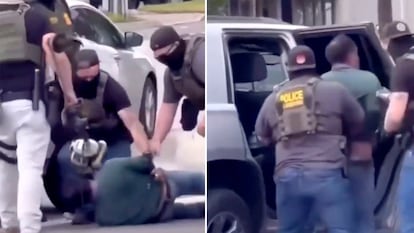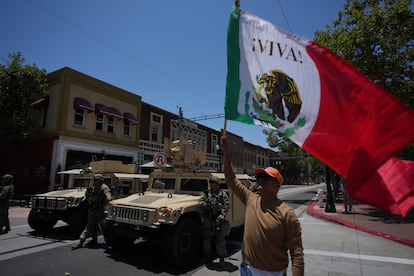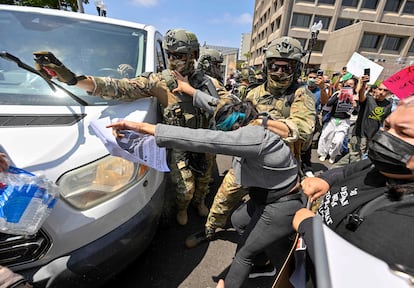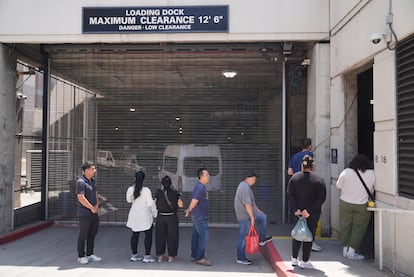The end of Narciso’s American dream: The brutal arrest of a Mexican gardener shocks Santa Ana
ICE’s weekend action has sparked fear across several Latino communities in Southern California


Narciso Barranco’s American dream ended in a nondescript shopping center in Santa Ana. The 48-year-old gardener was trimming bushes on Saturday at the Pacific Center, where there is a Home Depot — a store that has become a common target in federal operations arresting undocumented immigrants across Southern California. Barranco’s chance arrest, simply for being in the wrong place at the wrong time, has sparked outrage over the violence with which it was carried out. It has also cast a heavy shadow of fear over Latino communities in the region.
On Wednesday afternoon, Taquería Guadalajara in downtown Santa Ana looked deserted. “Today we sold four aguas frescas and only had two tables,” says Miguel, 27. The waiter, who asked not to reveal his full name, says customers have stopped coming to the Mexican restaurant over the past two weeks. “People don’t want to leave their homes... A couple of cooks haven’t shown up since Monday,” he explains. Miguel was born in the U.S., but has many undocumented relatives.
On Fourth Street in Santa Ana, one of the city’s main avenues — where 77% of the population is Latino — Mexican flags hang outside several businesses. They are a sign of resistance amid the surprise raids carried out over the past few days. Regardless of the type of business — from a cowboy clothes store, a gourmet restaurant, to an old-fashioned remittance shop — most are nearly empty. Donald Trump’s immigration policy is also being felt in the local economy.

The clerk at a small jewelry store in the area, who asked to remain anonymous out of fear of the authorities, says the owners decided to close the business early on two days last week due to the lack of customers. “We’re doing worse than during the pandemic,” says the woman, who has worked at the shop for seven years.
A significant portion of the store’s income comes from the commissions they earn sending money to Mexico. With Trump’s arrival, explains the woman, who is originally from Michoacán, remittances surged. But transactions have plummeted since Immigration and Customs Enforcement (ICE) ramped up its operations. “There are days when we don’t even make a $100 in sales,” she laments.
It’s not just fear that has emptied the streets. Caution has too. Authorities in Cudahy and Bell Gardens — two predominantly Hispanic cities not far from Santa Ana — have decided to postpone Independence Day celebrations planned for next week “for the safety of residents.” The mayor of the former, where 97% of the population is Latino, has canceled a public event featuring live music, food stalls, and a fireworks show.
A group of activists from Santa Ana and Orange County mobilized this week to pay seven street vendors so they wouldn’t be forced to go out and risk being caught in a raid while trying to earn a living. For several weeks now, the Trump administration has shifted the focus of its immigration raids. In the early days, the priority was criminals or individuals with criminal records. Now, anyone is at risk.

ICE recently reported that it detained 1,600 people across Southern California — the region with the highest number of undocumented immigrants in the United States — through June 22. Of those, 722 were captured in the Los Angeles metropolitan area during the first 10 days of the month. Fifty-seven percent of this second group had no criminal record and were not being sought for any crime. The vast majority, 82%, are men, and nearly half are originally from Mexico. Sixteen percent come from Guatemala, and 8% from El Salvador, according to figures from the Deportation Data Project, an information center backed by the University of California, Berkeley School of Law.
This shift in federal strategy had already been highlighted by Karen Bass, the mayor of Los Angeles, who has had a tense relationship with Washington over the deployment of troops to the city in response to protests against the raids. “I don’t know how you go from a drug dealer to a Home Depot, to people’s workplaces where they’re just trying to make a living,” the Democratic politician said a few days ago. On Wednesday, a photo went viral of an abandoned ice cream cart in the streets of Culver City after federal agents detained its owner, Enrique Lozano, who had been selling ice cream in the area for 20 years.
Father of US Marines
It was while working that federal agents caught Narciso Barranco by surprise. Authorities from the Department of Homeland Security claim that the gardener brandished a weed trimmer in the face of one of the ICE officers. But at least three videos — recorded by witnesses to the brutal arrest — contradict the official version. They show the worker fleeing from the officers, even trying to jump into a moving vehicle to escape. The masked officers subdued him and beat him on the ground.
Narciso’s eldest son, Alejandro Barranco, visited his father on Tuesday afternoon. He found him in a cell shared with 70 other people, where water and food are scarce. His father’s eyes were swollen, and he was still wearing the same bloodstained shirt he had on at the time of his arrest.

Alejandro told NBC that his father, who left Mexico at 17 to immigrate to the United States, raised him and his two brothers to admire their new country. When asked about his father’s violent arrest, he said: “It doesn’t make me love my country any less. It makes me love it more because I see all these people standing up for people like my dad.” Barranco enlisted in the Marines and was deployed to Afghanistan, where he even helped with the final evacuation of Kabul. His two brothers are also in the Marines.
The story of an undocumented man with three children who have dedicated their lives to serving the United States has taken the public by surprise. The family has stated that they had already begun the Parole in Place process, a benefit reserved for undocumented family members of U.S. service members. This program offers a path for spouses, parents, and siblings of military personnel to regularize their immigration status. However, the process can take several years and is often contingent on whether the beneficiary entered the country legally. In Narciso’s case, since his entry was irregular, the situation is more complicated. The machinery of deportation reached Barranco long before he had a chance to legalize his status.
Sign up for our weekly newsletter to get more English-language news coverage from EL PAÍS USA Edition
Tu suscripción se está usando en otro dispositivo
¿Quieres añadir otro usuario a tu suscripción?
Si continúas leyendo en este dispositivo, no se podrá leer en el otro.
FlechaTu suscripción se está usando en otro dispositivo y solo puedes acceder a EL PAÍS desde un dispositivo a la vez.
Si quieres compartir tu cuenta, cambia tu suscripción a la modalidad Premium, así podrás añadir otro usuario. Cada uno accederá con su propia cuenta de email, lo que os permitirá personalizar vuestra experiencia en EL PAÍS.
¿Tienes una suscripción de empresa? Accede aquí para contratar más cuentas.
En el caso de no saber quién está usando tu cuenta, te recomendamos cambiar tu contraseña aquí.
Si decides continuar compartiendo tu cuenta, este mensaje se mostrará en tu dispositivo y en el de la otra persona que está usando tu cuenta de forma indefinida, afectando a tu experiencia de lectura. Puedes consultar aquí los términos y condiciones de la suscripción digital.








































